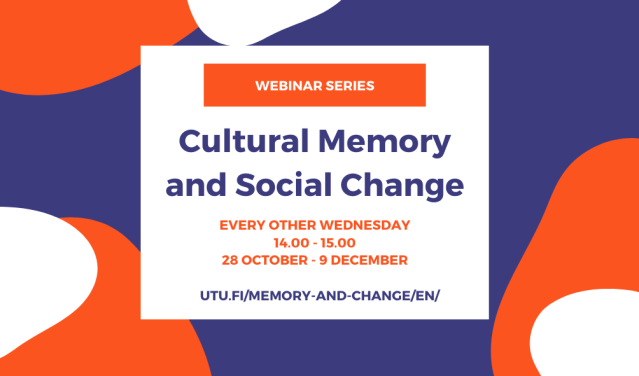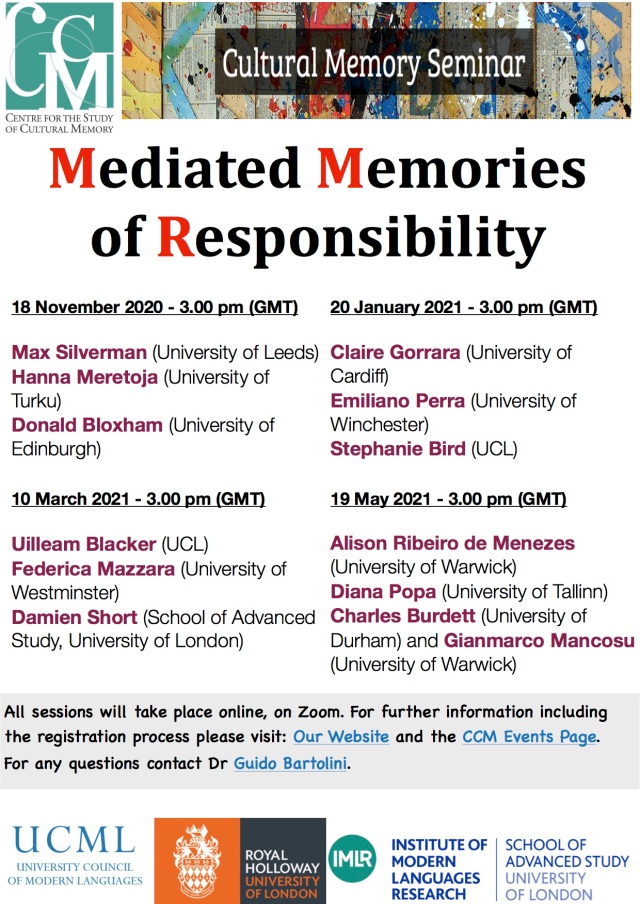Past events – 2020
NOTICE: Due to the epidemic and the closing down of the university from 18 March onward, all SELMA events for the Spring were cancelled.
Thursday 5 March, 12–14 – Gender Perspective on Memory and Narrative
(Minerva, Jäntere E121)
 Kaiju Harinen: “Gender and blackness in African Francophone autobiographical literature written by Ken Bugul”
Kaiju Harinen: “Gender and blackness in African Francophone autobiographical literature written by Ken Bugul”
Ken Bugul’s novel, Le Baobab fou, [The Abandoned Baobab. The Autobiography of a Senegalese Woman], focuses on the memories of a young “black” woman and discriminations related to “race”, sexualized gender and the myth of ‘true womanhood’ that the novel’s protagonist experiences in the context of postcolonial Europe. Autobiographical literature serves here as a political tool for healing the stigma of the colonial experience (Mouzet 2015, 161), as announced in the paratext of the novel: The obliterated shall be remembered. Ken Bugul’s life story can also be seen as a cautionary tale (Coly 2010, xix) for other black young women desiring to ‘become white’ and to live in Europe–the Eldorado. In order to do that, the author uses strategic exoticism, performativity, irony and burlesque humour, and storytelling to make visible the apparently invisible intersectional oppression.
Lotta Kähkönen: “Failing in Gender: Narratives of Embodied Vulnerability”
Gender Failure (2014) is a book based on a live performance show by two Canadian artists, Rae Spoon and Ivan Coyote. The book delves into the artists’ memories of and journeys with their failed attempts to fit into gender binary. The artists emphasize storytelling as an art form that enables a transformative space. In this talk, I will discuss how the storytelling in Gender Failure explores embodied vulnerability and works as embodied practice. Failing to approximate “proper” corporeal norms in the spatially and temporally shifting frames of gender binary causes a risk in the artists’ everyday lives. Yet the sense of vulnerability as a differentiating condition is not perceived simply as disabling and negative experience, but as something that can be shared through storytelling, and in so doing, even turned into a possibility.
Kaiju Harinen holds a PhD in Francophone literature. Her doctoral thesis, defended in October 2018 at the University of Turku (Finland), focused on the discrimination related to “race”, gender, sexuality, social class and religion that the protagonists of Calixthe Beyala’s and Ken Bugul’s semiautobiographical novels, young “black” women, experience in the context of postcolonial Europe and West Africa. She is currently working as a part-time teacher at the University of Helsinki and prepares a postdoctoral research project about the intersectional encounters of afropolitanism and storytelling applied in various fictional and feminist texts written by Jo Güstin, Léonora Miano, Minna Salami and Taiye Selasi in French and in English.
Lotta Kähkönen is University Lecturer in Gender Studies at the University of Lapland. She is also a member of a research project studying the implications of the Texas Campus Carry law, conducted at the John Morton Center for North American Studies, University of Turku. Her research interests include gender and embodiment, transgender experiences, trauma narratives, and U.S. gun culture.
Thursday 27 August – Päiväkirjojen jäljillä -keskustelutilaisuus.
Turun kaupunginkirjasto (Turku City Library)
Book launch of an edited volume on diaries, co-edited by Maarit Leskelä-Kärki, Karoliina Sjö & Liisa Lalu
Thursday 30 October, 10 am – The Impossible Return: Post(?)-Shoah in the Work of Anna Langfus (1920-1966)
Born in Lublin, Poland, in 1920, Anna Langfus lost her father, mother and husband to the Shoah. In 1947, she emigrated to France. After an initial foray into theatre, she turned to novel writing, choosing French as the language of her fiction. Her second novel earned her the 1962 Prix Goncourt – France’s highest literary prize – but her career was cut short by her premature death in 1966. Anna Langfus leaves us three novels, imaginative works largely drawing from her own personal and direct experience of loss, estrangement and alienation, and thus exhibiting signs pertaining to literary trauma texts. Yet, very early on, Langfus felt compelled to circumnavigate the paradox inherent to trauma narratives. Considering that she was entrusted (indebted?) to a truth that she was not the sole depository of, Langfus believed she had to find mechanisms allowing her to “narrate the unnarratable”. In this presentation, I will discuss examples of the strategies, imagery, and rhetorical devices Anna Langfus has recourse to in her survivors’ narratives, which are all three centred around the question of post-Holocaust identity.
France Grenaudier-Klijn (PhD) is Associate Professor of French and French Subject Convenor in the School of Humanities, Media & Creative Communication at Massey University, New Zealand. She has published widely on Patrick Modiano (1945-), including a 2017 study of the functions and attributes of femininity in Modiano’s work. Her chapters and articles have been concerned with post-Shoah French literature (P. Claudel; L. Binet; A. Desarthe), contemporary French noir (C. Klein; T. Jonquet ; D. Sylvain), female writing (L. Nobécourt, C. Cusset) and French popular culture (S. Gainsbourg). Grenaudier-Klijn is also a specialist of French Belle Époque novelist Marcelle Tinayre (1870-1948). She is currently completing a new monograph devoted to referential figures in Patrick Modiano’s fiction.
Cultural Memory and Social Change -webinar series via Zoom

Wednesday 28 October, 14–15 – Education, media and politics in the making of social meanings
- Juho Ruotsalainen, Doctoral Candidate, Finland Futures Research Centre (FFRC): ‘Pioneer journalists and social imaginaries – what futures for journalism?’
- Tiago Queimada e Silva, Doctoral Candidate, Cultural History and European and World History: ‘The “Good Noblemen Who Conquered the Kingdom”: Islam and Aristocratic Political Legitimation in Medieval Portuguese Historiography’
Link to Zoom: https://utu.zoom.us/j/64519151314
Wednesday 11 November, 14–15 – Arts and popular culture as constructors and challengers of cultural memory
- Raita Merivirta, Postdoctoral Researcher, Cultural History and European and World History: ‘Cultural Memory and Counter-Memory in Indian English Literature’
- Lotta Kähkönen, University Teacher, Gender Studies: ‘Embodied Experieces of Art Making Art: Narrative Reflections by Transgender Artists’
Link to Zoom: https://utu.zoom.us/j/64867080391
Wednesday 25 November, 14–15 – Cultural memory and processes of social change in relation to inequality and multiculturalism
- Päivi Rannila, University Lecturer, Geography: ‘Urban inequality: the uses and orders of urban public spaces’
- Anna-Maria Isola, Senior Researcher, Social Work: ‘Family narratives behind intergenerational disadvantages and advantages’
Link to Zoom: https://utu.zoom.us/j/69591583988
Wednesday 9 December, 14–15 – Culture, health and well-being
- Katriina Siivonen, University Lecturer, Finland Futures Research Centre (FFRC): ‘Cultural Sustainability as a Transformative Power’
- Avril Tynan, Postdoctoral Researcher, TIAS: ‘Dementia Diagnosis and Narrative Ethics: The Case of the Metaphysical Detective Novel’
Link to Zoom: https://utu.zoom.us/j/63533757120
Wednesday 18 November, 3–5pm (GMT) – Seminar of Cultural Memory: Mediate d Memory of Responsibility
d Memory of Responsibility
The Mediated Memory of Responsibility seminars, organized by Centre for the Study of Cultural Memory (School of Advanced Study, University of London) will bring together scholars working on the cultural representation of the violent past of the twentieth century across a variety of media and cultures. The seminar series aims to examine the contribution of cultural products to exposing the crimes of the perpetrators and disseminating a sense of responsibility for the past in relation to events such as colonialism, wars, and dictatorships. Interdisciplinary in nature, the seminars will explore the theme of responsibility across textual and visual media and in various national contexts, leading to fruitful cross-fertilisations and the possibility of future cooperation among scholars working within different disciplines.
Speakers taking part in the first seminar held on 18 November 2020 include Professor Max Silverman (Leeds), Professor Hanna Meretoja (Turku), and Professor Donald Bloxham (Edinburgh).
Click here for a recording of the event!
17–19 November – Ars Moriendi – conversation series at Aboa Vetus & Ars Nova (IN FINNISH)
Ars Moriendi/Turku 2020 on osa Ars Moriendi -yhteistyöverkostoa. Sen toteuttavat Turun alueen kirjallisuusterapeutit yhdessä Ars Moriendi -verkoston, Aboa Vetus -museon, Turun yliopiston SELMA-tutkimuskeskuksen sekä Nuorten työpaja Fendarin kanssa.
Ars Moriendi on taidetta, kuolemantutkimusta, esitystapahtumia, keskusteluja ja ihmisiä yhteentuova alusta ja verkosto, jonka teemana on kuolema (http://www.arsmoriendi.fi).
Lisätietoa Turun tapahtumasta: Päivi Kosonen (paivi.kosonen@ajatusmatka.fi)
17.11.2020, 17.30–20 – Keskusteluja kuolemasta ja elämästä
Tapahtuman ensimmäisenä päivänä keskustellaan elämään ja kuolemaan liittyvistä yhteisistä ja eksistentiaalisista teemoista. Turun yliopiston viisaiden naisten paneelikeskustelussa pohditaan, miten kuolemasta kerrotaan ja miten se kuvitellaan meillä ja muualla. Entä miten siitä kirjoitetaan ja miten sitä käsitellään taiteessa? Keskustelun lopuksi tehdään pieni kirjoitusharjoitus, jossa jokainen saa liittää yhden lauseen osaksi kollektiivista Ars Moriendi -sanataideteosta.
Paneelikeskusteluun osallistuvat kuolemantutkija, antropologi Maija Butters, kulttuurihistorian dosentti Maarit Leskelä-Kärki, uskontotieteen dosentti Tiina Mahlamäki sekä kirjallisuustieteen professori Hanna Meretoja. Paneelin juontaa Päivi Kosonen.
Illalla kuullaan myös Anna-Maria Toivosen musiikkiesitys. Anna-Maria Toivonen on musiikkiterapeutti, kansanlaulaja ja tarinankertoja.
18.11.2020, 17.30–20 – Päiväkirjakatkelmia kuolemasta ja elämästä
Toisena päivänä luetaan ääneen elämää ja kuolemaa käsitteleviä päiväkirjakatkelmia. Lukemisten ja yleisökeskustelujen päätteeksi tehdään pieni kirjoitusharjoitus, jossa kaikki osallistujat saavat liittää yhden lauseen osaksi kollektiivista Ars Moriendi -sanataideteosta.
Päiväkirjatekstien lukijoina toimivat kirjoittajat sekä Turun alueen kirjallisuusterapeutit. Tilaisuuden juontaa Hanna Ruohikko.
19.11.2020, 17.30–20 – Kirjoituksia kuolemasta ja elämästä
Kolmantena päivänä pidetään luovan kirjoittamisen työpaja. Illan aikana tehdään lyhyehköjä kirjoitusharjoituksia, joissa pohditaan kuolemaa ja päiviä ennen sitä. Kirjoitusharjoitukset tehdään ensisijaisesti itselle, mutta illan aikana niitä on myös mahdollisuus jakaa. Myös kolmantena päivänä osallistujat saavat liittää yhden lauseen osaksi kollektiivista Ars Moriendi -sanataideteosta ja ilta huipentuu yhteisen sanataideteoksen valmistumiseen.
Työpajojen ohjaajina toimivat Turun alueen kirjallisuusterapeutit.


